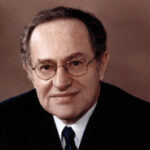by Alan M. Dershowitz
Should a distinguished Harvard professor of psychiatry be subject to formal investigation and potential discipline for doing research on the possibility that people who clam that they were abducted by space aliens may not all be crazy after all? This question is dividing the academic community, which is watching carefully as Harvard Medical School completes its year-long investigation into the research of Dr. John Mack who wrote the controversial best-seller Abduction: Human Encounters with Aliens.
The Dean of Harvard Medical School established the faculty committee last year, and it has met 30 times, with lawyers and with Dr. Mack. Its mission is presumably to determine whether Dr. Mack’s research and clinical activities satisfy certain unspecified academic criteria. But, at bottom, the committee will necessarily be asking whether a Harvard Medical School Professor ought to be lending his credibility to stories of space alien abductions. It is extremely unusual for great universities to second-guess the research or publications of their tenured faculty, except for allegations of fraud, plagiarism or violations of patients’ or students’ rights.
For example, New York City College has never formally investigated the “research” and claims of Professor Leonard Jeffries that “melanin” has in influence on racial characteristics and makes blacks better than whites, or of a white professor who has argued the blacks have lower IQs than whites. Harvard, moreover, is denying that the Mack investigation “is a disciplinary or tenure matter”—at least for now. But any formal investigation of a professor’s ideas raises serious concerns about the chilling of academic freedom. Will the next professor who is thinking about an unconventional research project be deterred by the prospect of having to hire a lawyer to defend his ideas?
If Dr. Mack had taught at the Divinity School, it is unlikely that any investigation would be tolerated, since divinity schools are not governed by the laws of science. Indeed, it is at least as likely that space aliens exist as it is that God exists. The former is, however, a scientifically testable hypothesis (at least in theory); whereas the latter—for at least most theologians—is not. It is a matter of “faith,” not proof, and faith is not subject to the scientific method. But the paradigm of the scientific method—propositions subjected to double-blind and replicable experimentation—is not the only criteria for evaluating academic undertakings. This is certainly true in the formative, exploratory phases in the development of an idea. If Sigmund Freud, Karl Marx or Martin Buber had been required to satisfy a committee before they could continue their research the world might have been deprived of significant insights.
In the end, it is unlikely that the Harvard Medical School will do anything to Dr. Mack. Nor is it likely that Dr. Mack himself will be deterred from pursuing his research agendas though other more timorous professors may. What is troubling is the principle behind a dean convening an investigative committee, at least in the absence of clear guidelines or criteria. Unless challenged now, the precedent-setting effect of the appointment of this committee will act as a sword of Damocles, hanging over the head of every professor who drifts outside the mainstrearn, especially in politically sensitive areas. It is noteworthy that the issue of space aliens is not a politically, racially or sexually divisive one. Imagine if a committee were to be convened to examine controversial research that touched on any of these hot-button issues. There would be student demonstrations, alumni threatening to withhold contributions and perhaps even governmental pressure. The dean’s decision to appoint an investigating committee should quickly be reversed and the damage undone before it establishes a dangerous precedent. No great university should be in the business of investigating the ideas of its faculty.
To be sure, it is legitimate for a university to be concerned about the integrity of its faculty’s research. There are widely accepted criteria by which such integrity is judged: research must be reported honestly; sources must be attributed properly; informed consent must be obtained; biases must be disclosed. But these are not the criticisms directed against Dr. Mack’s research. What is on trial in his case are his ideas — his willingness to consider the possibility that the numerous accounts of alien abductions may not all be products of insane delusions. He has certainly not convinced me, but surely that cannot be the criteria.
Let those who disagree with Dr. Mack’s research respond to it on the merits — by reviews, rebuttals, debates and books of their own. The marketplace of academic ideas is wide open. Dr. Mack’s idea “shop” in the marketplace should not be shut down; nor it be subjected to extraordinary “inspections.” Critics should open their own idea “shops” and try to compete. Eventually the truth will out. That is what a university is all about.
 Alan M. Dershowitz is Felix Frankfurter Professor of Law at Harvard Law School.
Alan M. Dershowitz is Felix Frankfurter Professor of Law at Harvard Law School.
© 1995 Alan M. Dershowitz
Originally published by The Harvard Crimson
June 30, 1995, p.2
Dr. Dershowitz submitted the editorial with the working title as “Space Aliens, Academic Freedom and Harvard Med School”, authored on or just prior to June 1, 1995.